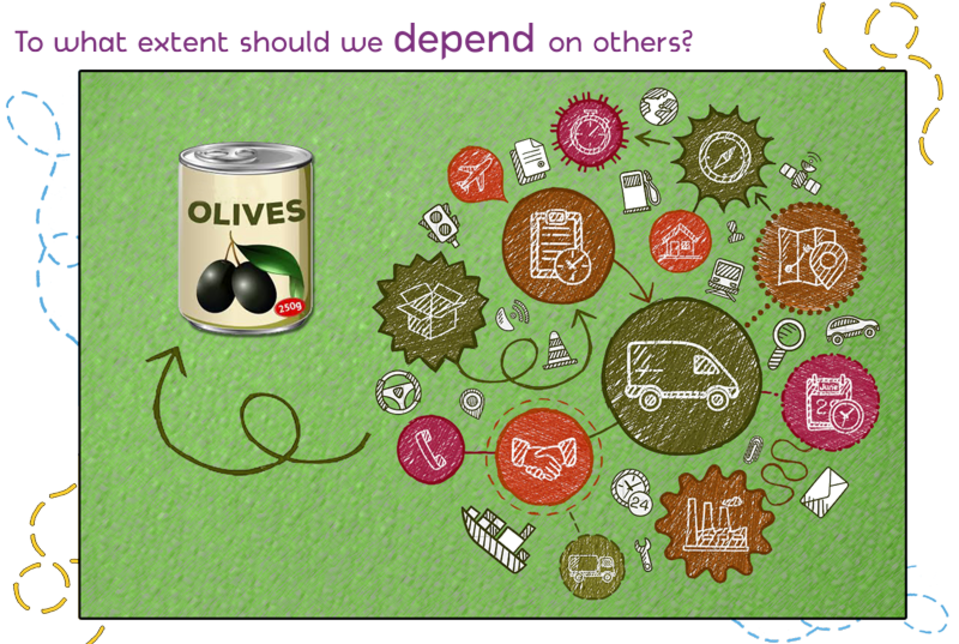
The chain of interdependence
| Objective: To play with the concept of interdependence by tracing back the production chain of an object! |
Duration : 15 to 45 minutes
Material :
- Sheets of paper
- Pencils, felt-tip pens, eraser
Instructions :
When you hold something in your hand, whether it's a smartphone or a tin can, it's hard to appreciate the history that got it there. It must have taken a lot, like collecting materials from several countries, combining the skills of dozens of people and transporting all these items thousands of kilometres to get the object to you! In this activity, your mission is to trace back this entire production chain to better understand our interdependence.
...
-
Find your object. Walk around your home to find an object that has is human-made. Almost any object will do, but remember that the more complex the object you choose, the longer the chain of interdependence you will likely trace back!
-
Find out more about your object. Take a moment to try to imagine for yourself how your object was made. Start at the beginning by thinking about the materials found in the object and how those materials can be collected. Then think about the people and machines that made the object from these materials: how many people do you think had to work, not only to make the object, but also to assemble and maintain the machines that construct it? After that, think about how the object was moved: do you think it was transported by truck? By train? By boat? It must have taken a lot of people to organize this transport... And don't forget the people who work in the shop where the object was bought: who took it out of the truck, put it on a shelf and checked it out at the counter before it finally made it to your home? If you can, go on the internet to find out more about the object, for example by typing "how X is made" with X being your object, using a search engine and/or video site.
-
Draw the chain of interdependence.. On a piece of paper, draw all the steps involved in making your object, using both your imagination and your knowledge. For each step, make a small drawing with a sentence describing the work done at that step and the people who did the work, then make an arrow to the next step. You can also represent the chain in a completely different way—it's up to you!
-
Think about interdependence. After tracing back this dizzying chain of interdependence, ask yourself: Does depending on one another make us stronger or weaker? Are there things for which we do not depend on others? Do we depend on other things besides humans? Why or why not?
...
Bonus : Choose a person who works in the chain of interdependence and try to imagine their life. Think about where they live, what their day might look like, what their desires and fears might be. What might they be thinking about while they are working to make your object? After you have done this, ask yourself: Is it hard to imagine another person's life? What would help you do that? Do you think it's important to make an effort to imagine other people's circumstances, even if they are very different from you? Why or why not? |

| Tricks for tots : If you prefer, choose one of your toys and look at it carefully. Try to imagine how your toy was invented. Who do you think made it? What gave them the idea for this toy? Maybe while making it, that person thought about children like you and how you most like to play. How do you think the inventor felt when they created your toy? Draw this moment of invention on a piece of paper. Finally, ask yourself: Who do ideas belong to? Why? |
| Tips for teens : Every person in the chain of interdependence had to work for this object to eventually get to your home: Do you think that all of these people work in good conditions and are paid fairly? Should all types of work be paid the same? We probably need to think about what determines the value of work... Maybe all work should at least be paid enough to allow workers to live a decent life... As consumers, do we have a responsibility to the people who make our products? Why or why not? |
Share your creative reflections by sending them via email.
Include photos of your projects and notes of your thoughts, as well as your first name and your age!


